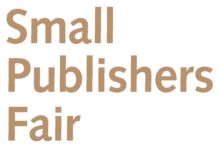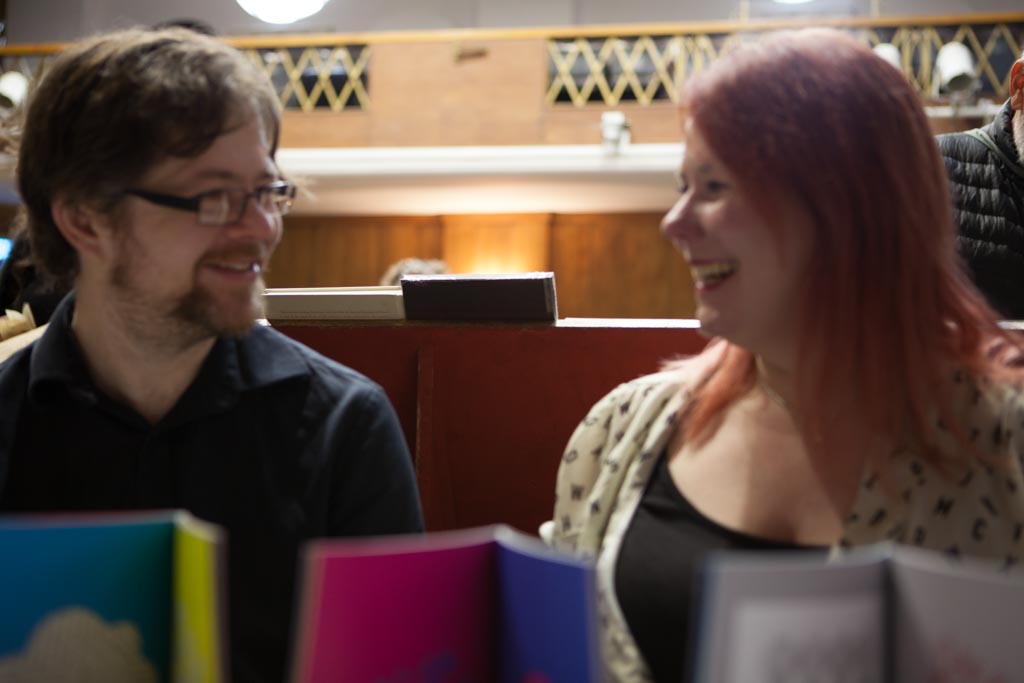Penteract Press is the Shropshire-based imprint of poet Anthony Etherin and illustrator and designer Clara Daneri. Here Anthony writes about his work on The Penteract Podcast.
Begun before lockdown the series includes interviews with John Bevis, Christian Bök, Stephen J Fowler, Joakim Norling (Timglaset) and Astra Papachristodoulou, all of whom have taken part in the Fair. There are also interviews with Ian McMillan and with Helen Mitchell, organiser of the Small Publishers Fair.
It is hoped that The Penteract Podcast will be in residence at Small Publishers Fair 2022 to interview some of the participants and capture something of the event itself.
“Don’t worry. I’m not a great host, but I’m a pretty good editor.” This is how I would attempt to put my guests at ease, in the early days of The Penteract Podcast. And it was true: while I had some experience in sound editing, I had no experience at all conducting interviews. Moreover, I had only begun the podcast out of the compulsive feeling that it was something that needed to exist, rather than something I thought I might enjoy. The podcast began as an experiment: an attempt to fill what I perceived to be a void in my corner of the poetry community. I also saw it as a way of interacting with other poets, despite geographical obstacles. After all, Penteract Press is, I like to say, not a British press; it is an international press that happens to be based in the UK.
When the first episode aired, in February 2021, I had no idea just how onerous these geographical obstacles were to become. Many assume that I started the podcast because of some prescient awareness that lockdowns were on the way; the podcast’s inception, in fact, dates back to October 2019, long before anyone had heard of Covid-19.
Nonetheless, the pandemic, in many ways, has made the podcast what it is. Such were my insecurities and anxieties about being ‘the host’ — the anxieties inevitably felt by those who have no clue what they’re doing — there’s every chance I would have abandoned the podcast after those first few episodes, had I not extra motivation to continue. Lockdown provided that motivation: If I were to be communicating solely by video call for the foreseeable future, why not click record?
During the first lockdown, it soon became clear that Penteract Press would have to rethink its plans for the next couple of years. We were a relatively new press — we had only attended one book fair and only hosted one book launch. It now seemed it could be years before our next.
In the summer of 2020, Penteract Press had five books scheduled for publication. With no prospect of a live event, we turned to The Penteract Podcast, and published over four hours of material across five interviews, one for each of our newly-published poets. The podcast was now not only a way of providing a platform to the avantgarde, but a tool essential to the survival of our press.
It was around this time that my anxieties about hosting began to fall away — not that they will ever fully leave me, of course! Along with this, the podcast stopped feeling like a job. That is to say, to my surprise, I began to really enjoy it.
In December 2020, Clara and I hosted our first panel episode of the podcast — a discussion around visual poetry. We have since conducted six others. These panel episodes can feel like a small party; an antidote to life under lockdown, and an opportunity to emphasise the wonderful community spirit that exists among the international avantgarde. The podcast is ever-evolving. In the coming years, I hope to expand it beyond the world of poetry, while nonetheless remaining true to its original focus. Whatever new uses for the podcast come to mind, I will attempt; the experiment is ongoing.
Though it began as a tentative project that filled me with dread, The Penteract Podcast is now an essential and highly enjoyable part of my practice. Moreover, I have been able to catalogue the experiences, attitudes, and ideas of over 30 poets, in over 40 hours of material — an archive of which I am incredibly proud.
Anthony Etherin, December 2021




